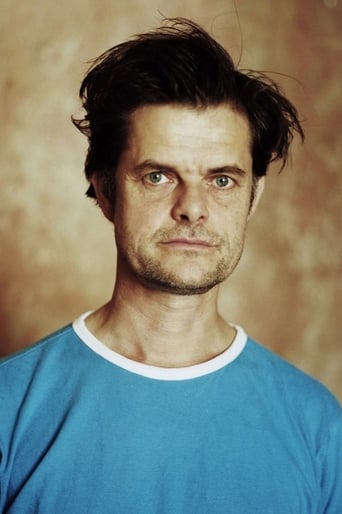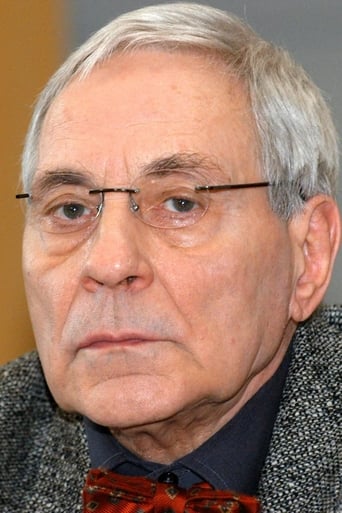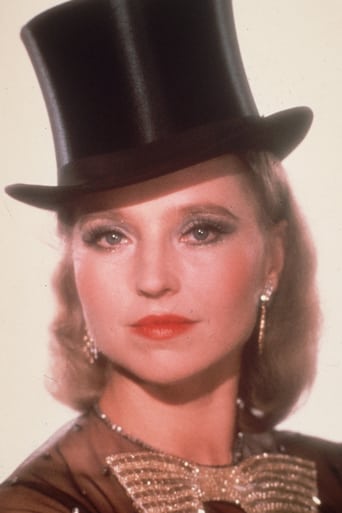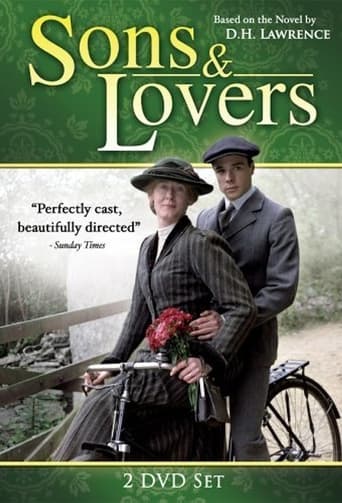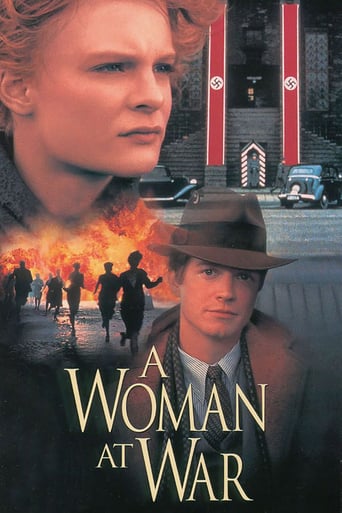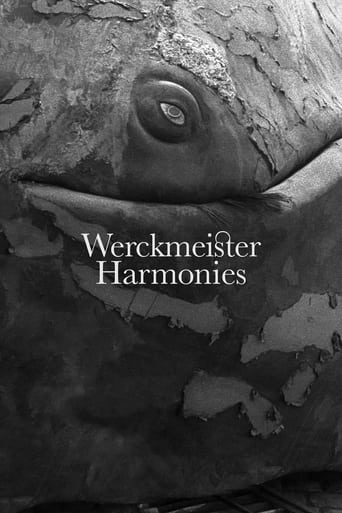
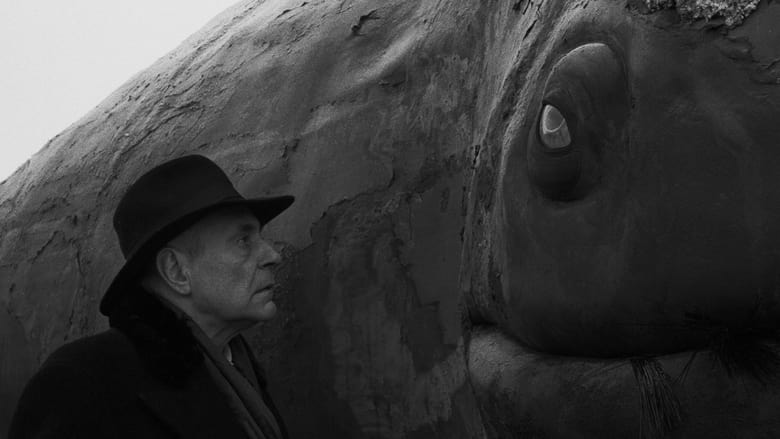
Werckmeister Harmonies (2001)
A mysterious circus excites a small Hungarian town into a rebellion when a promised act doesn't perform.
Watch Trailer
Cast
Similar titles

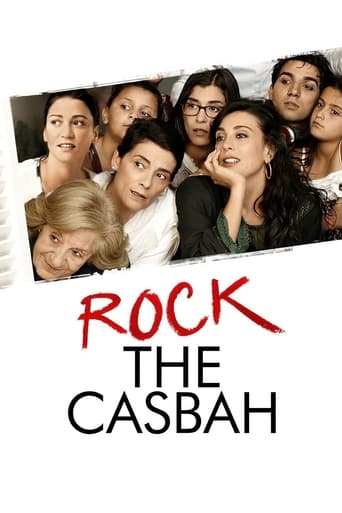
Reviews
Absolutely brilliant
Simple and well acted, it has tension enough to knot the stomach.
All of these films share one commonality, that being a kind of emotional center that humanizes a cast of monsters.
The film never slows down or bores, plunging from one harrowing sequence to the next.
The movie starts well enough, establishing a stark, gloomy atmosphere. We see the local postman Janos doing various things, in the process introducing us to some of the other characters in the story. Basically the story from here, in a nutshell, is that a sideshow consisting of a stuffed whale and a character known as 'the prince' (who we never see directly) arrives in the town square. The townsfolk start to gather in the square, becoming progressively more agitated as the film progresses, finally they go on some type of rampage, sacking the local hospital (it is implied that this is somehow at the behest of 'the prince'). It seems then the army moves in to round up the locals, and for some reason not fully explained, Janos is deposited in the local asylum. There are various small subplots which go nowhere (some type of local power play with Janos' relatives and some kind of musical analogy for the plot seems to be floated). This is more than enough for your average art film to hang its hat on, the problem more comes in the quality of ideas over the length of the movie. One can detect the influences of various directors, the most obvious being Tarkovsky and the long takes; at the start of the movie these long takes are full of movement and interest; however, as we progress, the motif becomes overused and dull. In the end, it seems the long takes of people walking take on an almost comic effect, with the director dragging it on just long enough to make you squirm before introducing a new element.One never really develops any empathy with any of the characters, most are only hastily drawn eastern European clichés, the main character starts to chew the scenery a little at the end, the actor seems somewhat unsure how Janos' mental state is meant to progress. Overall, it's as if the director spends a lot of time creating an interesting setting, then isn't quite sure what to do with it over the duration of the film. Werckmeister Harmonies is by no means a bad film, it just doesn't scale to the heights it so obviously aspires to.
"Werckmeister Harmonies" tells a tale like no other in a way like no one else has ever done before. If you're ready for a very different kind of art, feel free to follow a humble paper boy with the sense for wonder on his rounds. He has a clear picture in mind of what makes the universe tick, a strong belief that everything follows its preordained order, is in eternal harmony, a concept the musicologist he's working for vehemently denies - or at least that man is capable to understand it. Signs and portents already make it clear that the times are achanging, and soon shadows engulf an unnamed town in the middle of nowhere, when a circus arrives with a monstrous fish to be exhibited. And thus the young János sets out to see a whale, but what he'll get is a glimpse of an alienating apocalyptical eclipse happening right before his eyes..."Werckmeister Harmonies" is another highly politically, philosophically, existentially, even religiously charged work, depending which way you want to see it, made by the visionary Hungarian director Béla Tarr. Based on the novel "The Melancholy of Resistance" written by long-time collaborator László Krasznahorkai it is as uncompromising as the original text and Tarr's previous cinematic works, and will bring your attention span to its limits due to its extremely slow, yet sublimely otherworldly pace. As always when Krasznahorkai and Tarr set out on a new project, the action is of profound metaphysical relevance with cosmological principles at war, but nevertheless deeply rooted in social realism, in which one can read Hungarian disenchanted life before and/or after the fall of communism, references to wars and uprisings, to false prophets, fools and opportunists pulling the strings from behind the curtain. What is apparent from the get-go is that the film defies conventions. Stylistically it is nothing less than a revelation, even for Tarr adepts, provided you admit to the created mood. Photography is in striking black and white, all around aesthetically superb essays in motion - and above all perfectly timed, an essential key element in shots that last several minutes. Every scene forms a visual unit in itself, composed meticulously, executed flawlessly, enhanced either by absolute silence, precise sound or Mihály Vig's incomparable melancholic music on the soundtrack. "Werckmeister Harmonies" is much more than a movie, a unique work of art that delves deep and stirs profoundly. Essential viewing.
A small town. A drunk room; a rather dreary bar with two big lights hanging from the ceiling. Village simpletons falling all over the floor with an overdose of drinks. "You tubs of beer"..the bartender calls them! At closing time, a wide-eyed, gaunt, but seemingly popular young man walks in. He is Janos Valuska (Lars Rudolph). He uses the drunks at the bar as props and demonstrates the Solar Eclipse and the effects of this phenomenon on the behavior of the mortal beings of the earth. The scene lasts for the first 10-12 minutes and ends with a melancholic, haunting score by Mihaly Vig. This single scene is so beautiful, it sets the tone for what's to come.There is a shroud of ambiguity over Hungarian filmmaker Bela Tarr's "Werckmeister Harmonies" (co-directed by Ágnes Hranitzky). There is communication that is very vague. Things are spoken about something bad that happened before and something terrible that's perhaps about to happen. And in some towns, they say it has already begun. Is it the advent of the apocalypse? At the center of this mystery is a stuffed giant whale, a part of a "circus" that has arrived in town. This circus also features the enigmatic "Prince". With the coming of the whale and the Prince there is suddenly a 'lack of harmony' within the quietude of the town. Foreigners have started encroaching. There are stories that they have started rioting and looting. The whale is perhaps the reason. Most people seem to regard the whale as an abomination. Only Janos sees it as a bounty of nature, a miracle of God...Janos is clearly an optimist. Or is it the Prince who is behind all the turbulence? There are all kinds of stories. The dead whale and the Prince are somehow responsible for creating ripples in the otherwise still waters of the quiet little town. They have already spread their wings on other parts of the country. But are all these just urban legends? One of the main characters, György Eszter (Peter Fitz), speaks about how the musical intervals and harmonies as we know them over the centuries are "false" and the result of a huge scandal brought about by a certain Andreas Werckmeister. The title alludes to the harmonies or lack thereof owing to some funny business brought about by Werckmeister as a result of an "unhinged arrogance" that wished to take possession of the natural harmonies of the Gods! This one scene and the philosophy within has a strong connection with the overall theme of the film...lack of harmony and how it is brought about! Eszter's former wife Aunt Tunde (Hanna Schygulla) has an agenda of her own...she is out to initiate a "clean town" project with the help of her current lover, the Police Chief, for which she needs her former husband's help. "Our Janos" (as he is referred to by all townsfolk who like him) is entrusted the task of convincing Eszter to use his command and popularity to get support of the movement. Eszter reluctantly agrees. "I've paid for it and I may pay for it all my life", he says. But what exactly? Tarr doesn't think that is important. We never get to know. He clearly loves ambiguity.Tarr also loves extremely long takes, stark Black and White cinematography (beautiful at that), a somber mood, melancholic score, a languorous pace, bleak imagery and an overall sense of doom and despair. There are long philosophical monologues which are almost poetic and need to be heard at least twice to grasp. There is a distinct "meditative" feel to the proceedings. It is not difficult to spot the heavy Andrei Tarkovsky influence here, just as in other films of his. But Tarr's pictures are less abstract than those of the great Russian filmmaker. "Werckmeister Harmonies" is mostly materialism heavy but there certainly is some symbolism embedded in the narrative. The "Prince" who travels with the whale, for example, is a mysterious faceless creature who seems to have immense powers. A clock that was dead for years started ticking again as he went past! And he apparently also incites rioting. He doesn't believe in any greater power or authority either. Is he then the "Prince of darkness" with a thirst for destruction? Tarr demonstrates his ability to create a powerful impact through the marriage of visuals and sound. On one hand there is the scene in which Vig's soulful music accompanies, like Janos appreciating the whale and being awestruck by its enormity. And then there is the scene in a newspaper factory. Long monologues and ambient sounds serve as a background to Janos' mundane activities being filmed, and later the camera slowly pans to the person delivering the monologue! Then, of the several long tracking shots, a particular shot of Janos and Eszter walking adjacent to each other in an almost synchronized march of their feet (with only the sound of their feet and a lunch box providing the sound...carrying on for a good 2-3 minutes!) can't help but bring a smile on your face. Apparently, for one other scene, in which a lot of people are marching together to reach a destination, Tarr was asked why the scene is that long. Tarr simply answered "that's how long it took to get there!" "Werckmeister Harmonies", like any other Bela Tarr film, is surely not for the impatient viewer. It is for that segment of film lovers who love their films grave; and who don't mind the scenes playing out real time, with the editing process being allowed to take the back seat as long as the final product delivers. Suffice to say, Tarr manages to engulf the viewer under his spell and guarantees a hypnotic audiovisual experience, one that culminates into a powerful ending that leaves a lasting impact....Score: 10/10.
In modern cities, we're bombarded by sounds and images all the time, creating over-stimulation. As a result, we can't feel very strongly about any one thing we see. Werckmeister Harmonies takes place in a small Hungarian town, where not much ordinarily happens. The citizens are under-stimulated, and as a result, have the sacred ability to be moved to the core by small things. Bela Tarr wants us to be able to experience this with the townsfolk, and goes through great pains to do so. The film is made up of only 39 shots, each one spanning at least several minutes. As with Satantango, they chronicle the monotony of village life: long dreary walks, manually heating up water, the unhurried conversation.While I wouldn't say I found every moment of Werckmeister Harmonies riveting (perhaps the non-city dweller may fare better), I can easily say I did myself a favor by watching it. First of all, the imagery: Bela Tarr captures some of the most enchanting and unique images you'll ever see on film. The ambitious art direction and cinematography are perfectly realized, and the skill and artistry in the single-take scenes found here is astounding.The film's simple but beautiful soundtrack works well, and Tarr combines it masterfully with his imagery, creating a lot of memorable and powerful moments.My only complaint is that Bela Tarr hasn't mastered dialog to the extent that his predecessors have. Some of the dialog-driven scenes feel a bit stale, and serve to work against the wondrous tone that he painstakingly creates. But all is forgiven when the dialog fades and he is able to focus on poetic expression through imagery. Who else can make a circling helicopter appear so organic, and so strange?Also recommended: Tarkovsky's The Sacrifice and Roy Andersson's Songs from the Second Floor.
